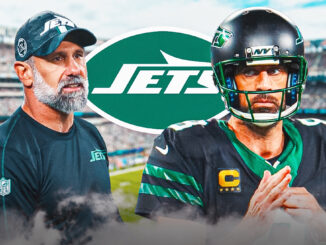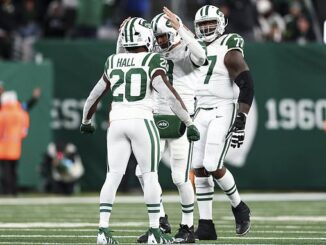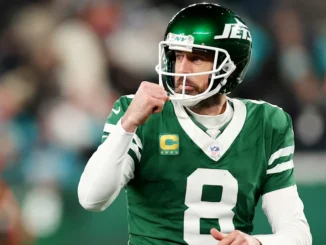
In a recent episode of *The Pat McAfee Show*, New York Jets quarterback Aaron Rodgers made headlines for his remarks on the war in Ukraine, raising eyebrows by questioning the legitimacy of mainstream narratives. Known for his candidness, Rodgers used the appearance to air his skepticism about the U.S. government’s involvement and the media’s portrayal of the conflict. He suggested that there may be forces manipulating public perception of the war, echoing familiar, though largely unsubstantiated, conspiracy theories circulating online. His remarks quickly gained attention, sparking debate over the influence of celebrity voices on public opinion and the role of sports figures in discussions of global affairs.
Rodgers, a prominent figure not just in football but across the cultural spectrum, has never shied away from voicing controversial opinions. His stance on COVID-19 vaccination in 2021 is one example; he criticized vaccine mandates and publicly admitted to using alternative treatments instead of traditional vaccination. For some, this outspoken, skeptical approach is a refreshing break from the conventional path many athletes take. For others, however, Rodgers’s comments carry the risk of spreading misinformation, especially when they involve issues as complex and sensitive as an international war.
The reaction to Rodgers’s comments on Ukraine has been mixed, with supporters praising his outspokenness and detractors accusing him of irresponsibility. Rodgers did not elaborate on specific conspiracy theories, but his choice to question the narrative around the war and hint at hidden motivations by global powers has implications. In an era where misinformation spreads quickly and can influence public perceptions, high-profile individuals like Rodgers hold significant sway over how their fans perceive issues beyond sports. Some argue that Rodgers’s remarks could lead listeners to doubt verified information, particularly on topics as impactful as a major armed conflict.
The role of *The Pat McAfee Show* in these discussions has also come under scrutiny. Known for its laid-back and often unfiltered style, McAfee’s show offers Rodgers a platform to speak freely, but some critics feel the lack of pushback on such topics can be problematic. McAfee and Rodgers share a close relationship, and McAfee typically allows Rodgers to speak candidly without much interruption. However, given that the show now has a partnership with ESPN, there are questions about how a major network might influence—or fail to influence—the content when such controversial opinions are shared on a nationally televised platform.
In discussing the Ukraine situation, Rodgers hinted that the U.S. government might be using the war to serve its own interests, echoing themes often seen in online conspiracy discussions about foreign interventions. He pointed to the vast amounts of financial aid sent to Ukraine and questioned whether American taxpayer dollars are being allocated responsibly. This rhetoric resonates with a segment of Americans who have grown increasingly skeptical of the government’s involvement in international conflicts, a sentiment that has gained momentum in recent years. However, Rodgers’s comments blur the line between healthy skepticism and promoting unverified theories, which has been a recurring concern in the era of “fake news.”
Rodgers’s foray into geopolitical topics has sparked a larger discussion about the intersection of sports and social commentary. Unlike many athletes who avoid political or controversial issues, Rodgers appears to relish diving into them, and he frequently uses his platform to question mainstream beliefs. His willingness to speak on these topics has positioned him as a polarizing figure. Some view him as a free thinker who refuses to be confined by public expectations, while others see him as someone who irresponsibly spreads misinformation by casting doubt on widely accepted facts.
Sports stars speaking out on political or social issues is nothing new; athletes from Muhammad Ali to LeBron James have used their platforms to influence public opinion on matters far beyond the realm of sports. Yet, Rodgers’s approach is distinct in its often skeptical and contrarian nature. His commentary frequently challenges mainstream perspectives, aligning him with the growing number of public figures who appeal to audiences skeptical of traditional media and institutional messaging. This approach has made him a hero to some but a contentious figure to others, particularly in a country increasingly divided over what constitutes “truth.”
For sports organizations and media networks, dealing with high-profile athletes who frequently speak out can be challenging. Rodgers’s comments have put *The Pat McAfee Show* in the spotlight, raising questions about the responsibility of platforms that give athletes and celebrities a voice. As a program affiliated with ESPN, McAfee’s show is part of a larger network that generally seeks to avoid political controversy. However, its popularity lies precisely in its unfiltered, informal style, and introducing tighter editorial controls could alienate its core audience. Balancing this freedom with accountability for the content shared by its guests is a tightrope act that McAfee and ESPN now face.
As for the Jets organization, Rodgers’s comments present a different kind of challenge. While the team has not publicly commented on his recent statements, it’s plausible that his remarks could stir distractions for a squad already facing a tough season. Typically, NFL teams prefer players to focus on the game, and Rodgers’s high-profile statements could lead to more media attention directed toward the organization, whether they want it or not. In a highly competitive and scrutinized league, having a player consistently in the spotlight for reasons beyond performance can be a mixed blessing.
Rodgers’s comments on Ukraine add to the broader conversation about the role of athletes in social and political discourse. With the rise of social media, athletes now wield more power than ever in shaping public opinion. Some, like LeBron James, use this power to advocate for social justice or call attention to systemic issues within the U.S. Rodgers, on the other hand, often uses his platform to question established narratives, resonating with people who feel disillusioned with conventional media and political systems.
However, critics argue that Rodgers’s comments on Ukraine are reckless, especially as they lack the context and nuance required to understand the complexity of an international conflict. By questioning the motives behind the U.S. government’s involvement, Rodgers risks simplifying a multifaceted issue, reducing it to vague insinuations that can be easily misinterpreted. For some, this kind of commentary is a form of entertainment; for others, it’s a cause for concern, especially given his influence over millions of fans.
In the end, Aaron Rodgers’s comments serve as a reminder of the power and responsibility that come with a public platform. While Rodgers is entitled to his views, the implications of his words extend far beyond his personal beliefs. For fans and media alike, this incident reflects the ongoing struggle to reconcile freedom of speech with accountability, particularly when those in the public eye speak on issues of global importance.



Be the first to comment